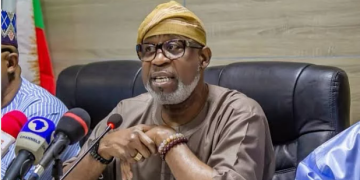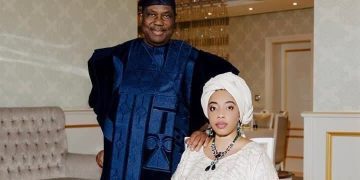By Jane Okafor, Abuja
The Supreme Court on Friday quashed the judgment of a lower court which dismissed the terrorism charges against leader of the proscribed Indigenous People of Biafra, Nnamdi Kanu.
The apex court held that the court of appeal erred in its position that the trial court couldn’t try Kanu because the prosecution violated his rights.
In the judgment prepared by Justice Garba Mohammed, the court condemned the invasion of Kanu’s residence in Afara – Ukwu in Abia State by Nigerian soldiers, declaring it irresponsible.
The court, however, held that there is no known law in the country stopping a trial on the grounds that a suspect’s rights were violated.
“We have made analogy of the use of
illegally obtained evidence or evidence obtained as a result of the of violation of the right of the accused to privacy and the evidence obtained as a result of illegal search.
“What is the response of our law to such situation. Our law is that despite what happened, that evidence is proper evidence before the court.
“If the police should illegally detained a person accused of commiting a crime and illegally arrest him, torture him and subject him to all kind of dehumanisation, should that divest the court of the jurisdiction to try the case brought against him in that process?
“The courts have continued to insist that as long their is a reasonable basis of suspicion of the commission of an offence, an accused should tried on that basis.
“If the police should destroy the house of a suspect to obtain exhibits, should that divest the court of entertaining the offence?
“His remedy should be the way of civil proceeding. Proceedings can’t be stopped on account of the violation of the rights of the suspect; that is not our law for now.
“We decided not to go with the court of appeal. Though we condemned the violation of his rights, Nigeria must redeem its image and adhere to the rule of law. If a person has been granted bail, why did you invade his house? That is irresponsible. You shouldn’t blame him for running.
“No legislation in the country stripped the trial court of the jurisdiction to go ahead with Kanu’s case, despite the illegal action of the FG.
“The law must take its course. The Court of Appeal was wrong that the trial court couldn’t try him. The appeal is allowed, and the cross-appeal is dismissed.”
The embattled IPOB leader was first nabbed by tbe authority in 2015 under the administration of former Nigerian President Muhammadu Buhari and lated granted bail in April 2017 but fled the country after an invasion of his home in Afara-Ukwu, near Umuahia, Abia State, by the Nigerian military in September 2017.
Kanu was re-arrested in Kenya and brought back to Nigeria in June 2021.
He was arraigned before the Federal High Court in Abuja on charges of treasonable felony, conspiracy to commit treasonable felony, illegal importation of radio equipment, and defamation of former President Muhammadu Buhari.
A twist crept in when the former Attorney General of the Federation, Abubakar Malami, SAN, withdrew the four charges and replaced them with a fresh 14-count charge bordering on terrorism and membership in a proscribed group, among others but the court pruned the charges to seven.
The Court of Appeal sitting in Abuja on October 13, 2022, held that how Kanu was brought back to Nigeria against his consent violated the country’s extradition treaty and was also a breach of his fundamental human rights.
The appellate court also struck out the terrorism charges filed against Kanu by the Nigerian government and ordered his release from the DSS facility.
The FG, through the office of the Attorney-General of the Federation, appealed the court ruling and subsequently obtained an order staying the execution of the court judgement at the Supreme Court.
Kanu, through his lawyers, filed an appeal against the stay of execution order at the apex court on November 3, 2022.
Not satisfied with the verdict of the appellate court, the FG filed an appeal at the Supreme Court.









































